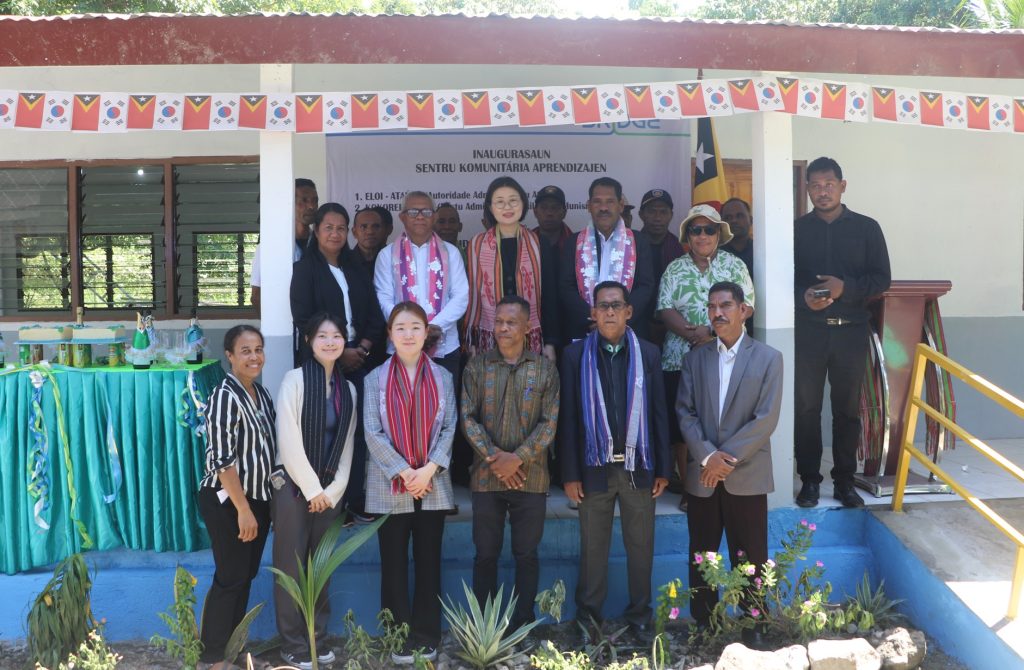On April 24, 2025, in Ataúru, the Korean National Commission for UNESCO (KNCU) partnered with the Timor-Leste National Commission for UNESCO (TLNCU) to hold the inauguration ceremony for two Community Learning Centers (CLCs) located in Ataúru and Aileu.

The ceremony was attended by representatives of the Korean National Commission for UNESCO (KNCU), officials of the Timor-Leste National Commission for UNESCO (KNTLU), municipal authorities, and community leaders, along with local community members who felt enthusiastic because the Korean National Commission for UNESCO (KNCU) and Timor-Leste National Commission for UNESCO (KNTLU) can establish a Community Learning Center (CLC) in Ataúru.
The new centers in Ataúru and Aileu are believed to be the beginning of a journey that will help adults learn to read and write. It will also give strength and motivation to young people to pursue their dreams. Additionally, teachers will have the opportunity to share their knowledge with the entire community in Ataúru and Aileu. Now, there is a space where kids, teens, and adults can better themselves.
The Community Learning Centers (CLCs) offer a variety of essential literacy programs, life skills training, and courses in technology and entrepreneurship. These initiatives aim to benefit individuals of all ages, from young children to adults, with a special emphasis on empowering women and youth.
In addition, the project increases Timor-Leste’s participation as an engaged member of the UNESCO cooperation network. The Korean National Commission for UNESCO (KNCU) and the Timor-Leste National Commission for UNESCO (TLNCU) believe that CLCs in Ataúru and Aileu can serve as a motivating example for other areas in Timor-Leste to improve community-focused education.
Director General of Pre-School Education, Basic Education, and Recurrent Education from the Ministry of Education, Mr. Apolinario Serpa Rosa, announced that the Ministry of Education will start financing the new center in 2026 to develop programs based on community needs.
“I encourage the people of Aileu and Ataúru, particularly the president of CLCs, because the Ministry of Education will provide $4,000 per year to each CLCs. Next year, our goal is to use these two CLCs annually for good functioning and develop a management plan to identify activities that can help young people who have not completed their basic education program for equivalence, we will introduce.” Basic Education and want to offer equivalence to Secondary Education as well.”
Mr. Mateus Belo, a local authority from Ataúru, acknowledged that establishing the new center is a challenge because it is necessary to determine which villages are in greatest need. He asked the community to support and take responsibility for the center.
The establishment of the center has been a challenge in other areas; however, due to limited funds and the efforts of the village chief, many people came to Beloi. It’s important for everyone to get involved, because the intention is not to hand out money but to provide resources. We all have to take part, not just observe.
According to Mr. Luis Nivio de Fátima Soares, Secretary General of the Timor-Leste National Commission for UNESCO (TLNCU), the addition of the two new CLCs means that Timor-Leste has now successfully established 15 centers according to plan, thanks to strong support from the Korean National Commission for UNESCO (KNCU) and effective communication with local officials. “We decided on these locations because the literacy rate is approximately 70% in Ataúru and 60% in Aileu, and our objective is to improve the literacy level.”
The community has initiated the CLCs Building Project, launching the CLCs Kokoroek-Aileu, which received funding of $27,770.80, together with CLCs Beloi-Ataúru, which received $23,048.50.
The completion of CLCs Ataúru includes features such as computers and furniture, financed by SEVENTEEN. These resources consist of computers, printers, sound systems, projectors, screens, and furniture such as desks, chairs, and cabinets. Additionally, CLCs Aileu also received a printer, sound system, and projector with a screen.
The Korean National Commission for UNESCO (KNCU) and the Timor-Leste National Commission for UNESCO (TLNCU) received other funding from PLEDIS, which is a sponsor or promoter of K-Pop music in Korea, and SEVENTEEN is a K-Pop music band that is now famous in Korea.
